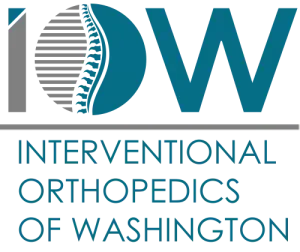Follow Us:
Open Hours
Tues - Fri 8:30 AM to 5:00 PM
Areas We Treat
Knee and Leg
Overview: Understanding Knee and Leg Pain
The knee is one of the largest, most complex, and most stressed joints in the body bearing weight, enabling movement, and absorbing impact. Pain in the knee or leg can drastically limit your ability to perform everyday tasks like walking, running, or even standing. At Interventional Orthopedics of Washington (IOW), we specialize in non-surgical, regenerative therapies that address the root cause of pain and dysfunction so you can avoid surgery and restore long-term joint health naturally.
Common Knee and Leg Conditions We Treat
We treat a wide range of acute, chronic, and post-surgical knee and leg conditions, including:
Osteoarthritis of the Knee
ACL/PCL/MCL/LCL Sprains or Tears
Meniscal Tears (Medial and Lateral)
Patellar Tendinopathy (Jumper’s Knee)
Runner’s Knee (Chondromalacia)
Iliotibial Band Syndrome (ITBS)
Bursitis (Pes Anserine, Prepatellar, Infrapatellar, Suprapatellar)
Hoffa Fat Pad Syndrome
Baker’s Cyst
Bone Marrow Edema
Avascular Necrosis of the Knee
Fabella Syndrome & Nerve Entrapments
Bursitis (Pes Anserine, Prepatellar, Infrapatellar, Suprapatellar)
Post-Surgical Knee Pain
Knee and Leg Areas We Specialize In
We precisely target all major and supporting anatomical structures of the knee and leg using image guidance and regenerative biologics, including:
Ligaments: ACL, PCL, MCL, LCL, Patellar Retinaculum
Tendons: Patellar, Quadriceps, Biceps Femoris, Popliteus
Meniscus: Medial & Lateral Menisci, Coronary Ligaments
Intra-articular Compartments: Patellofemoral, Medial & Lateral, Hoffa Fat Pad
Bursae: Prepatellar, Infrapatellar, Suprapatellar, Pes Anserine
Nerves: Genicular Nerves, Saphenous, Common Peroneal
Bone Access Points: Femoral Condyles, Tibial Plateaus, Patella
Patellar Structures: Retinaculum, MPFL, bursa and surrounding attachments
Around Surgical Hardware: Pain following previous interventions
This level of targeting ensures that healing agents are delivered exactly where your body needs them most.
Advanced Diagnostic Evaluation
Our treatment success begins with an accurate and comprehensive diagnosis. At IOW, we use a multi-modal diagnostic process to uncover the true source of your pain:
In-depth physical examination and movement analysis
Review of prior imaging and advanced diagnostics as needed (MRI, ultrasound, X-ray)
Real-time diagnostic musculoskeletal ultrasound
Image-guided diagnostic injections to precisely confirm pain sources
This diagnostic clarity allows us to create tailored treatment plans that restore function not just reduce symptoms
Types of Regenerative Treatments We Offer
Our non-surgical regenerative therapies are designed to heal tissues, restore joint function, and reduce the need for invasive procedures. All are performed in-office using image guidance for accuracy and safety:
Image-Guided Prolotherapy - stimulates healing in ligaments, tendons, and joints
Image-Guided Platelet-Rich Plasma (PRP) Therapy - promotes tissue regeneration using your body’s growth factors
Bone Marrow Concentrate (BMC) Cellular Therapy - injects stem-cell-rich marrow to support cartilage and tissue repair
Baker’s Cyst and Joint Aspiration & Injection
Patellar Tendon Hydrodissection
Fat Pad Injections (Hoffa)
Intraosseous Access to Femur and Tibia - targets bone-related pathology directly
When Is Surgery Needed?
At IOW, surgery is never our first recommendation. We understand the risks, downtime, and long-term limitations that often come with invasive procedures. Our goal is to:
Avoid unnecessary surgical intervention
Promote healing from within using orthobiologics
Support your long-term joint health through proactive care
Surgery may be considered only if there is severe structural damage and regenerative therapy is not viable. Even then, our team will walk you through your options and guide you every step of the way.
Why Choose IOW for Knee and Leg Treatment?
Choosing Interventional Orthopedics of Washington means trusting your care to a physician who:
Specializes in precision, image-guided regenerative treatments
Has deep experience treating complex and chronic orthopedic conditions
Understands whole-body biomechanics and how other joints and structures influence your knee health
Offers minimally invasive options that avoid surgery
Provides compassionate, personalized care tailored to your lifestyle
Whether you’re an athlete, active adult, or recovering from past injury or surgery, we’re here to help you move pain-free again.
Knee & Leg Regenerative Medicine FAQ
Why does my knee hurt?
The knee absorbs a tremendous amount of stress during daily activities and sports. Pain can stem from issues with bones, cartilage, ligaments, tendons, nerves, or soft tissue often due to injury, overuse, or joint degeneration.
What are the risk factors for knee or leg pain?
Risk factors include high-impact sports, aging, obesity, repetitive kneeling or squatting, and prior injuries. Underlying health conditions like gout or lupus can also contribute to chronic knee discomfort.
What are the most common injuries that cause knee or leg pain?
We frequently treat ligament sprains (like ACL or MCL), meniscus tears, tendon damage, arthritis, and pain related to post-surgical complications. These injuries often affect stability and mobility across the entire leg.
Is my knee pain connected to other joints or muscles?
Yes. Pain in the knee often links to surrounding structures like the hips, ankles, or low back. Dysfunction in one area can affect biomechanics throughout the body, which is why we take a full-body approach.
How do you diagnose the root cause of knee or leg pain?
We combine movement analysis, physical exam, diagnostic ultrasound, and image-guided injections to pinpoint the source of pain. This ensures precise treatment for faster, more effective recovery.
Can knee pain be treated without surgery?
Absolutely. Our regenerative treatments such as PRP, prolotherapy, and stem cell therapy stimulate natural healing and reduce inflammation without the need for invasive surgery.
Can’t find your condition on the list?
You might be a candidate. Schedule your free discovery call and let’s explore your options.

Interventional Orthopedics of Washington
Fax: (425) 326-1667
Clinic Hours
Open:
Tues – Fri 8:30am to 5pm
Closed:
Sat, Sun, Mon
© Copyright 2025 Interventional Orthopedics of Washington
